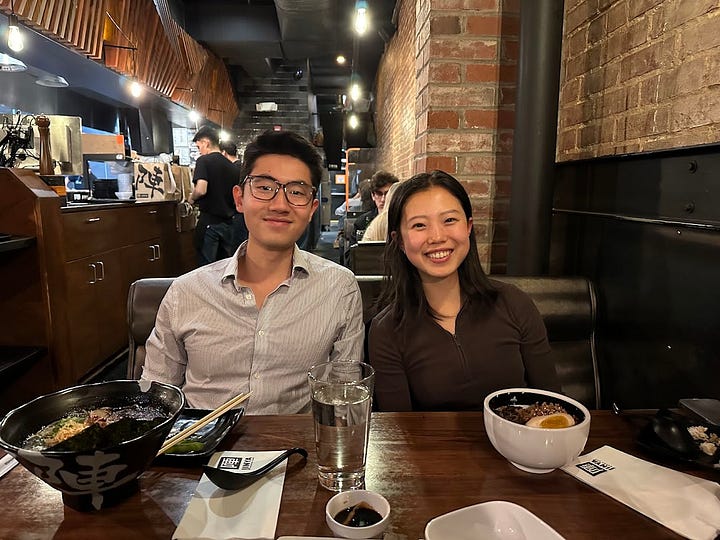If you could take shrooms to alter a negative thought pattern you have, what would it be?
I imagine a majority of women would, like me, say something related to body image. They’d plunge into the pure waters of childhood, washing away all socialized conceptions of beauty standards.
Z said she was curious about what men would say. Real problems, she imagined—not that body image isn’t real, but she was alluding to how much body image is a whale sitting in our minds when it should really be the size of a fish. Although masculinity is also socialized, it’s not as obtrusive—not generating insecurities you think every day when you look into a mirror.
At post-run club drinks, I asked this question to a group of guys. Their responses indeed were related to individual struggles rather than collective ones: people pleasing tendencies, difficulty with expressing and receiving emotions, decision paralysis. However, the underlying thread of all these insecurities is the desire to break free from the shackles of how we should behave, to spill our inner workings onto a canvas and have someone call it art.
how to be more confident in your relationships
It’s no secret that working on my insecure attachment style is a long-term aspiration of mine. So far, I’ve broken it down into more bite-sized resolutions: ask interesting questions and master the art of conversation, be the connector among my friend group, be a good host, etc.
Here are some mantras that I aim to embody, in order from easiest to hardest:
Have genuine curiosity for others. Ask questions people haven’t thought of the answer to.
Be authentic about your emotions and let down your ego. You’re funnier than you think you are.2 You’ll realize everyone is just stumbling around blindly, waiting for someone else to admit it first.
Find people who “match your freak.” You don’t need—and shouldn’t get—everyone to like you. One of the fastest ways I became close friends with K was our first long conversation began with trying to prove we were weirder than the other.
Surround yourself with people who value you and express it in ways that match your love languages. Likewise, surround yourself with people who induce the urge to shower them with care and praise. Identify their superpowers quickly and see strengths no one else can.
When you find yourself comparing yourself to others, you have to remind yourself that you must be willing to trade 100% of your current life for 100% of theirs.
Look at people on the train and remind yourself that they have an entire world inside their head—and feel how a sense of connection flows from you. You can do this with animals, too, and plants, and objects, and ideas. Pay attention to things as if they are too big to fit in your head—and feel love seep out of you. Do small acts of kindness and don’t take credit. Care more than necessary.
“On feeling connected” by Henrik Karlsson
If I’d masterfully internalized these mantras, I wouldn’t have to publish them on the internet to hold myself accountable. A week after writing this segment, having tried to attend various run club events in D.C., my social confidence is at an all-time low. Chemistry just isn’t chemistrying. Trying to break into a friend group is like throwing an egg at a brick wall playing that it won’t crack.
The mission to crawl out of a debt in confidence reminds me of failed attempts to uplift low-income countries out of poverty.3 Everyone knows that eliminating corruption and effectively allocating financial resources are conducive to economic growth, but if a country is knee-deep in debt, it cannot afford to improve its governance. Likewise, the mantras that supposedly increase your confidence are hard to implement if you don’t have any self-esteem to begin with. As the saying goes, beggars can’t be choosers.
Funnily enough, the best advice might come from looking at the patterns of successful entrepreneurs. Interpersonal skills are crucial to their success—and the best part is that it’s not all innate. While I have no desire to launch a startup, I’ve found the takeaways applicable to my own life:
Dealing with “no.” Did you know Mormons are disproportionately represented among successful entrepreneurs? Through engaging in proselytization, they’ve been trained to face rejection. The death of the ego is their biggest superpower. When an interaction doesn’t click, you need to learn to not take it personally.
Don’t brute force it. At the same time, successful entrepreneurs know when to quit work that becomes unfulfilling. Likewise, you have to know when it’s appropriate to give up trying to make someone meet your expectations for friendship. Rather, lean into the friendships that feel easy. This is not to say that you don’t have to put yourself out there, but neither do you have to jam two puzzle pieces together that simply don’t fit. That also means letting go of friendships that don’t serve you—something that I’m still struggling with.
Find partners in life. Finally, Raz advises everyone to find a partner/partners in life. It could be romantic, platonic, collegial, or familial. My own accountability partners4 hold me to a high standard built upon mutual respect. They’re not afraid of calling out any poor behavior or breaking down my delusional thought patterns.
Or… you could do shrooms.
Shout out to these D.C. folks 😊





Thanks, K
Thanks, TN
This is not meant to trivialize economic development goals. I just find it an apt analogy.
MK, K, and C






hmm that’s a good question, I would probably try to quiet my inner monologue that leads to a fear of rejection
Super interesting to read. I'd get rid of negative memories of people yelling at me as a child for naively making mistakes. Those memories do nothing productive for me.